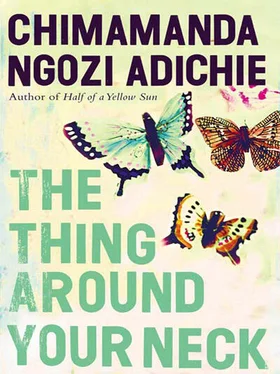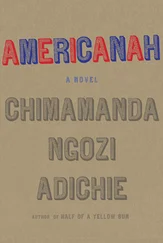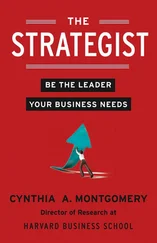You locked yourself in the bathroom until he went back upstairs, and the next morning, you left, walking the long windy road, smelling the baby fish in the lake. You saw him drive past — he had always dropped you off at Main Street — and he didn’t honk. You wondered what he would tell his wife, why you had left. And you remembered what he said, that America was give-and-take.
You ended up in Connecticut, in another little town, because it was the last stop of the Greyhound bus you got on. You walked into the restaurant with the bright, clean awning and said you would work for two dollars less than the other waitresses. The manager, Juan, had inky-black hair and smiled to show a gold tooth. He said he had never had a Nigerian employee but all immigrants worked hard. He knew, he’d been there. He’d pay you a dollar less, but under the table; he didn’t like all the taxes they were making him pay.
You could not afford to go to school, because now you paid rent for the tiny room with the stained carpet. Besides, the small Connecticut town didn’t have a community college and credits at the state university cost too much. So you went to the public library, you looked up course syllabi on school Web sites and read some of the books. Sometimes you sat on the lumpy mattress of your twin bed and thought about home — your aunts who hawked dried fish and plantains, cajoling customers to buy and then shouting insults when they didn’t; your uncles who drank local gin and crammed their families and lives into single rooms; your friends who had come out to say goodbye before you left, to rejoice because you won the American visa lottery, to confess their envy; your parents who often held hands as they walked to church on Sunday mornings, the neighbors from the next room laughing and teasing them; your father who brought back his boss’s old newspapers from work and made your brothers read them; your mother whose salary was barely enough to pay your brothers’ school fees at the secondary school where teachers gave an A when someone slipped them a brown envelope.
You had never needed to pay for an A, never slipped a brown envelope to a teacher in secondary school. Still, you chose long brown envelopes to send half your month’s earnings to your parents at the address of the parastatal where your mother was a cleaner; you always used the dollar notes that Juan gave you because those were crisp, unlike the tips. Every month. You wrapped the money carefully in white paper but you didn’t write a letter. There was nothing to write about.
In later weeks, though, you wanted to write because you had stories to tell. You wanted to write about the surprising openness of people in America, how eagerly they told you about their mother fighting cancer, about their sister-in-law’s pree mie, the kinds of things that one should hide or should reveal only to the family members who wished them well. You wanted to write about the way people left so much food on their plates and crumpled a few dollar bills down, as though it was an offering, expiation for the wasted food. You wanted to write about the child who started to cry and pull at her blond hair and push the menus off the table and instead of the parents making her shut up, they pleaded with her, a child of perhaps five years old, and then they all got up and left. You wanted to write about the rich people who wore shabby clothes and tattered sneakers, who looked like the night watchmen in front of the large compounds in Lagos. You wanted to write that rich Americans were thin and poor Americans were fat and that many did not have a big house and car; you still were not sure about the guns, though, because they might have them inside their pockets.
It wasn’t just to your parents you wanted to write, it was also to your friends, and cousins and aunts and uncles. But you could never afford enough perfumes and clothes and handbags and shoes to go around and still pay your rent on what you earned at the waitressing job, so you wrote nobody.
Nobody knew where you were, because you told no one. Sometimes you felt invisible and tried to walk through your room wall into the hallway, and when you bumped into the wall, it left bruises on your arms. Once, Juan asked if you had a man that hit you because he would take care of him and you laughed a mysterious laugh.
At night, something would wrap itself around your neck, something that very nearly choked you before you fell asleep.
Many people at the restaurant asked when you had come from Jamaica, because they thought that every black person with a foreign accent was Jamaican. Or some who guessed that you were African told you that they loved elephants and wanted to go on a safari.
So when he asked you, in the dimness of the restaurant after you recited the daily specials, what African country you were from, you said Nigeria and expected him to say that he had donated money to fight AIDS in Botswana. But he asked if you were Yoruba or Igbo, because you didn’t have a Fulani face. You were surprised — you thought he must be a professor of anthropology at the state university, a little young in his late twenties or so, but who was to say? Igbo, you said. He asked your name and said Akunna was pretty. He did not ask what it meant, fortunately, because you were sick of how people said, “‘Father’s Wealth’? You mean, like, your father will actually sell you to a husband?”
He told you he had been to Ghana and Uganda and Tanzania, loved the poetry of Okot p’Bitek and the novels of Amos Tutuola and had read a lot about sub-Saharan African countries, their histories, their complexities. You wanted to feel disdain, to show it as you brought his order, because white people who liked Africa too much and those who liked Africa too little were the same — condescending. But he didn’t shake his head in the superior way that Professor Cobbledick back in the Maine community college did during a class discussion on decolonization in Africa. He didn’t have that expression of Professor Cobbledick’s, that expression of a person who thought himself better than the people he knew about. He came in the next day and sat at the same table and when you asked if the chicken was okay, he asked if you had grown up in Lagos. He came in the third day and began talking before he ordered, about how he had visited Bombay and now wanted to visit Lagos, to see how real people lived, like in the shantytowns, because he never did any of the silly tourist stuff when he was abroad. He talked and talked and you had to tell him it was against restaurant policy. He brushed your hand when you set the glass of water down. The fourth day, when you saw him arrive, you told Juan you didn’t want that table anymore. After your shift that night, he was waiting outside, earphones stuck in his ears, asking you to go out with him because your name rhymed with hakuna matata and The Lion King was the only maudlin movie he’d ever liked. You didn’t know what The Lion King was. You looked at him in the bright light and noticed that his eyes were the color of extra-virgin olive oil, a greenish gold. Extra-virgin olive oil was the only thing you loved, truly loved, in America.
He was a senior at the state university. He told you how old he was and you asked why he had not graduated yet. This was America, after all, it was not like back home, where universities closed so often that people added three years to their normal course of study and lecturers went on strike after strike and still were not paid. He said he had taken a couple of years off to discover himself and travel, mostly to Africa and Asia. You asked him where he ended up finding himself and he laughed. You did not laugh. You did not know that people could simply choose not to go to school, that people could dictate to life. You were used to accepting what life gave, writing down what life dictated.
Читать дальше











